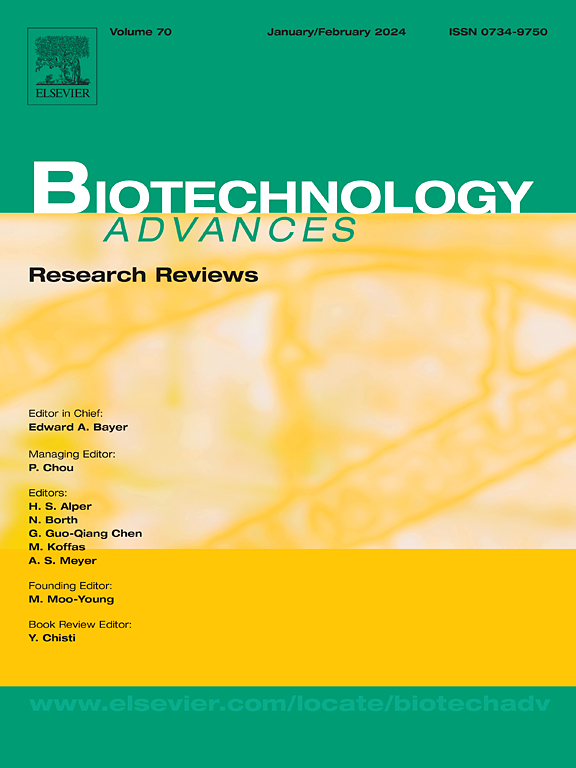Unleashing the potential of microbial biosynthesis of monoterpenes via enzyme and metabolic engineering
IF 12.1
1区 工程技术
Q1 BIOTECHNOLOGY & APPLIED MICROBIOLOGY
引用次数: 0
Abstract
Monoterpenes (MTPs) are valuable isoprenoids widely used in cosmetics, food flavorings, pharmaceuticals, etc. Compared to plant extraction and chemical synthesis, microbial biosynthesis offers superior sustainability and efficiency in producing natural MTPs, overcoming the limitations of raw material dependency, environmental impact, and racemic mixtures inherent in these methods. This review comprehensively discusses the development of natural or non-natural biosynthetic pathways for producing regular and irregular MTPs, emphasizing the importance of enzyme and metabolic engineering to optimize monoterpene synthases (MTPSs) in various engineered microbial cell factories (MCFs). The advances in functional expression of MTPS to enhance enzyme activity, substrate channeling of MTPS with critical biosynthesis enzymes, protein engineering of MTPS, targeted localization of MTPS in the subcellular organelle, and other favorable engineering strategies are discussed in detail. Leveraging these technologies, the engineered microbes will achieve the production of the defined product profile with higher titer/yield/productivity and improved industrial adaptability. Furthermore, we highlight the important development direction for optimizing MTPS performance and biosynthetic pathways, ensuring the microbial production of natural MTPs in a more efficient and application-specific manner.
利用酶和代谢工程释放微生物合成单萜烯的潜力。
单萜烯是一类有价值的类异戊二烯,广泛应用于化妆品、食品香料、医药等领域。与植物提取和化学合成相比,微生物生物合成在生产天然MTPs方面具有更高的可持续性和效率,克服了这些方法固有的原料依赖、环境影响和外消旋混合物的局限性。本文综述了单萜烯合成酶(MTPs)的天然或非天然生物合成途径的研究进展,强调了酶和代谢工程在各种工程微生物细胞工厂(mcf)中优化单萜烯合成酶(MTPs)的重要性。详细讨论了MTPS增强酶活性的功能表达、MTPS与关键生物合成酶的底物通道、MTPS的蛋白质工程、MTPS在亚细胞器中的靶向定位以及其他有利的工程策略的进展。利用这些技术,工程微生物将以更高的滴度/产量/生产率和更好的工业适应性实现定义产品的生产。此外,我们还强调了优化MTPS性能和生物合成途径的重要发展方向,以确保微生物更有效地生产天然MTPS和特定的应用方式。
本文章由计算机程序翻译,如有差异,请以英文原文为准。
求助全文
约1分钟内获得全文
求助全文
来源期刊

Biotechnology advances
工程技术-生物工程与应用微生物
CiteScore
25.50
自引率
2.50%
发文量
167
审稿时长
37 days
期刊介绍:
Biotechnology Advances is a comprehensive review journal that covers all aspects of the multidisciplinary field of biotechnology. The journal focuses on biotechnology principles and their applications in various industries, agriculture, medicine, environmental concerns, and regulatory issues. It publishes authoritative articles that highlight current developments and future trends in the field of biotechnology. The journal invites submissions of manuscripts that are relevant and appropriate. It targets a wide audience, including scientists, engineers, students, instructors, researchers, practitioners, managers, governments, and other stakeholders in the field. Additionally, special issues are published based on selected presentations from recent relevant conferences in collaboration with the organizations hosting those conferences.
 求助内容:
求助内容: 应助结果提醒方式:
应助结果提醒方式:


